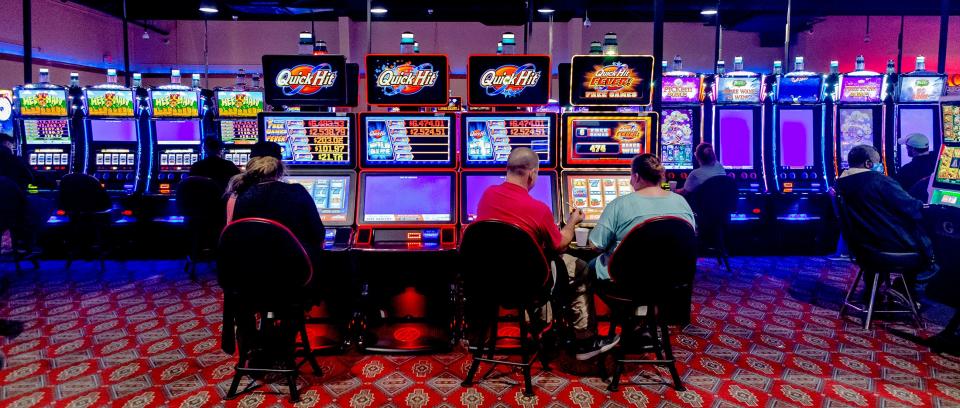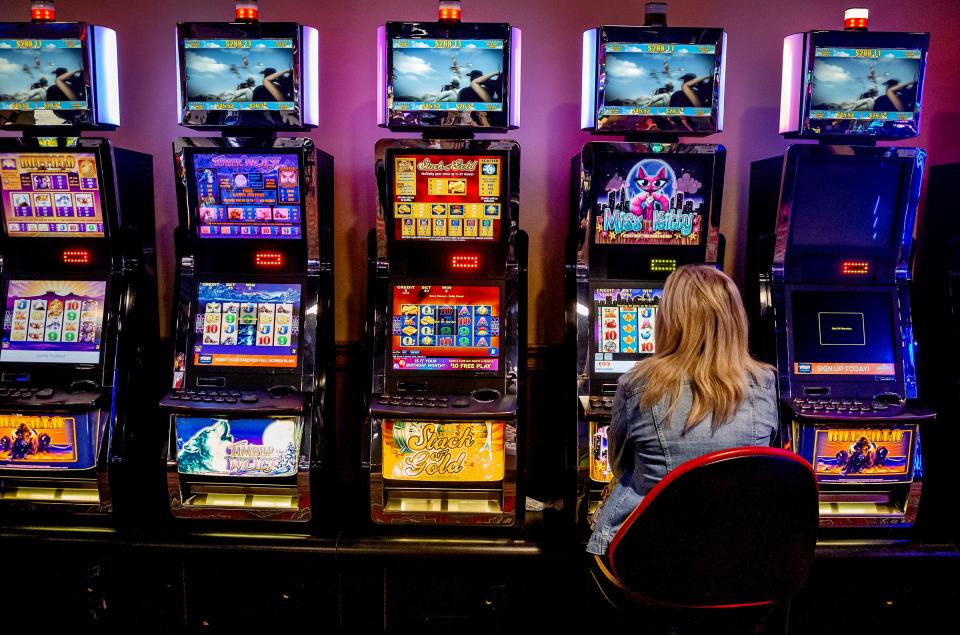Many states allow legal sports betting. Why not Oklahoma?
It may be too early to set the odds for legal sports betting in Oklahoma this year, but a state lawmaker is renewing the push to make it happen.
Oklahomans can already drive across the state line into Kansas and Arkansas to legally bet on the outcomes of sporting events. Or they can log in to online sports books that operate illegally outside the United States.
Oklahoma helped revolutionize the tribal gaming industry in the 1990s and is now one of the largest gaming markets in the United States. But the state has lagged behind its peers when it comes to sports betting and mobile gaming, which have quickly expanded to an $8 billion-plus industry.
“We’re playing catch-up, and that’s not a position we should have been in,” said Rep. Ken Luttrell, R-Ponca City. “We should have been the leaders in this. We should have been the very first state to have this.”

Luttrell’s proposal, House Bill 1027, would open the door for sports betting in Oklahoma by allowing it to be added to the state-tribal gaming compact. A similar bill last year failed without broad support. It was limited to in-person betting. The new version also would allow people to use their phones to bet on sporting events. Pressure is growing from inside and outside of Oklahoma to extend legal betting beyond casino floors.
Still, the proposal needs buy-in from state and tribal leaders, which could require some changes. Whether all the pieces can fall into place during the four-month legislative session that begins Feb. 6 remains unknown. Gaming has been a key point of contention between Oklahoma Gov. Kevin Stitt and many tribal leaders since 2019.
The sticking point is likely to be the same now as then: how much money the state receives from tribal gaming proceeds. Stitt repeatedly has criticized Oklahoma’s existing share of tribal gaming revenues, which amounted to $195.4 million in 2022, as too low.
But technology and construction costs make sports betting expensive to launch, so it may not pencil out for many tribes if costs are too high.
Gaming revenues are usually the biggest funding stream for tribal governments to cover costs such as education, construction and development. The state spends most of the exclusivity fees it receives from gaming on public schools.
“I would continue to stress everybody needs to be at the table: tribes, the Legislature and the governor’s office,” said Matthew Morgan, who leads the Oklahoma Indian Gaming Association.

Of the 26 tribal governments the group represents, there is no broad consensus yet about what sports betting should look like in Oklahoma, said Morgan, who is a Chickasaw Nation citizen and Choctaw Nation descendant.
Luttrell and Stitt are both Cherokee Nation citizens.
Stitt said Jan. 3 on Twitter that he backs sports betting and pledged “more to come” about his stance. Through spokesperson Carly Atchison, the governor declined to comment on House Bill 1027, saying he does not comment on legislation before it reaches his desk.
“Gov. Stitt supports sports betting in Oklahoma as long as it’s fair, transparent and the state can maximize revenue potential to invest in top priorities, like education,” Atchison said.
Luttrell, who co-leads the legislative Native American caucus, said he has received initial support from some tribal leaders and their attorneys. He said he believes the terms he has proposed are fair to tribes, who would need to shoulder upfront costs, and the state, which is losing out on revenue to its neighbors. Luttrell’s northern Oklahoma district sits next to Kansas and incorporates lands of the Kaw, Osage and Ponca nations.
“Some people are going into Kansas and spending their money in Kansas and letting Kansas reap the benefits,” he said. “We’re not getting the income from it.”
Under the current proposal, tribal gaming operations would make monthly and yearly exclusivity payments to the state, based on how much money they bring in from sports bets placed on phones and in casinos. Monthly payments would top out at $200,000, while annual payments would have no cap and amount to 5% to 6% of gross revenues.
Morgan said he has not discussed those specifics with tribal leaders, whose nations each have unique economic considerations. Some have access to large markets near Tulsa and along the Interstate 35 corridor, he said, while many are located in rural regions.
Osage Nation Principal Chief Geoffrey Standing Bear said last week that sports betting is important to address as gaming evolves, and that it might take time to work out terms. “There’s going to be a lot of voices in there,” he said.
Since the Legislature first approved the state-tribal gaming compact in 2004, there have been few changes. Negotiations led to the addition of some table games, such as roulette, in 2018, the final year Gov. Mary Fallin was in office. Oklahoma receives 4% to 6% of money wagered on slot machines with random odds and 10% on non-house banked table games.
The slow progress to further expand gaming has prompted at least three Oklahoma tribal nations — the Chickasaw, Eastern Shawnee and Wichita and Affiliated Tribes — to pursue mobile gaming outside of the compact. Tribes can operate bingo-based games without state sign on.
The Chickasaw Nation in south-central Oklahoma, which has one of the largest gaming operations in the state, got federal regulators to sign off on rules that would allow it to offer a bingo-based gaming app. The Eastern Shawnee Nation in northeast Oklahoma and Wichita and Affiliated Tribes in western Oklahoma are partnering with a sports-themed app that uses bingo to determine winners.
The Quapaw Nation is the lone Oklahoma tribe to currently offer mobile sports betting, but only in Arkansas, where it has a state license. The Cherokee Nation is pursuing an Arkansas license, as well.
In Texas, Gov. Greg Abbott has said he’s open to exploring gaming, and the legislature will consider a bill that could open the door to state-licensed casinos and sports betting. The external pressures could increase the pressure on Oklahoma to act, especially since Texas gamblers make up a big chunk of Oklahoma’s gaming market.
“It’s a win-win for our tribal partners and our citizens,” Luttrell said.
Molly Young covers Indigenous affairs for the USA Today Network's Sunbelt Region. Reach her at mollyyoung@gannett.com or 405-347-3534.
This article originally appeared on USA TODAY: Sports betting in Oklahoma remains a gamble as other states expand

 money
money 